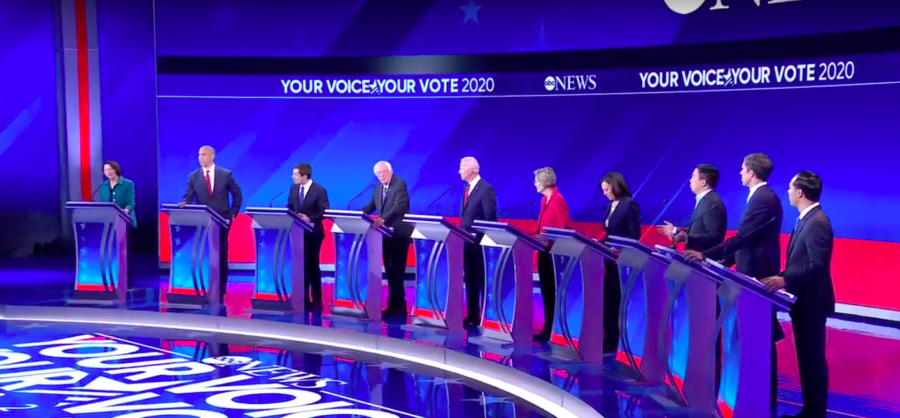Third Democratic presidential debate features contention between candidates
The Democratic presidential debate Sept. 12 was the first to feature all 10 polling leaders on the same stage. The debate Tuesday featured the top 12 polling candidates.
September 12, 2019
The third Democratic presidential debate late Thursday featured all the polling leaders on stage for the first time.
The debate started out “contentious” and featured too much “petty squabbling,” said John Klaus, a Story County Democrats precinct co-chair.
However, Klaus said it was “inspiring to see candidates overcome that” by the middle and end of the debate.
The first question asked in the debate focused on health care, and split the candidates into different groups, those that want all public health care, those that want to keep healthcare privatized, and those that want to see a mixed system.
Sen. Bernie Sanders wrote a so-called “Medicare for All” bill, which would eliminate private insurance, a bill Sen. Amy Klobuchar disagreed with. Klobuchar said she would like to see a split system in which both public and private health care are available.
Sen. Kamala Harris is a co-sponsor of Sanders’ Medicare for All bill, however has her own additional health care proposal.
Former Vice President Joe Biden disagreed as well. Biden said “‘Obamacare’ worked,” and he would simply want to build on the former president’s plan, keeping insurance mostly private.
The issue of health care appeared to be the “most contentious” Klaus said. The digs the candidates took at each other frustrated him. Klaus said it was “petty squabbling.”
Biden was questioned about the record high number of deportations that took place under him as vice president, and whether he felt they were a mistake.
Biden said in response the DACA program to provide legal status for some undocumented immigrants who entered the United States as children was started by him and former President Barack Obama, but never answered the question directly.
At his lack of direct response former Housing and Urban Development Sec. Julián Castro criticized Biden’s tendency to take credit for the positive aspects of Obama’s presidency, while avoiding the negative ones.
South Bend, Indiana Mayor Pete Buttigieg pushed back at Castro on Castro’s cross-examination of Biden’s statements.
Castro pointed out debates are supposed to be contentious in order for a party to sort out what it wants in a presidential nominee.
“That’s called an election,” Castro said. “This is what we’re here for, it’s an election.”
Foreign policy was discussed multiple times throughout the night. One common thread for every candidate was their condemnation of President Donald Trump’s foreign policies. Almost every candidate criticized at least one aspect of Trump’s policy.
Klobuchar disagreed specifically with Trump’s tariffs on China, saying they hurt the economy, noting soybean growers in her home state of Minnesota and in Iowa have been hurt by the tariffs.
Sen. Elizabeth Warren said “foreign policy in America has been broken for decades.” Referring to “corruption” and a focus on “big corporations” rather than smaller interests, Warren said she would bring unions, small farmers, and environmentalists to the trade table.
Booker chose to focus on the issue of climate change as it relates to foreign policy. He said America’s worsening relationship with its allies hurts its ability to combat global climate change and challenge China’s violations of environmental regulations.
Yang echoed Warren’s sentiment on the issue of climate change. He said America was controlled by corporate interests.
Yang’s solution to the issue is a concept he called “democracy dollars”.
Yang said the plan would give every American citizen $100 to be put towards a political issue of their choice. Yang said this would force lobbyist’s out of congress and give back control of congress to the American people, though he did not offer evidence for his claim.
The debate closed with candidates asked to discuss their most serious set back, and how they overcame it.
Many candidates cited their personal journey from where they started, to the start of their career in politics. Others focused solely on their political career and the growth of their support and voter base over time.
The fourth Democratic debate will be on Oct. 15 and 16, with all of the candidates from Thursday’s debate automatically qualifying, joined by recent qualifier Tom Steyer.
Editor’s Note: A previous version of this story incorrectly said Sen. Kamala Harris disagreed with Sen. Bernie Sanders’ “Medicare for All” bill. The story has been updated to note Sen. Kamala Harris is a co-sponsor of Sen. Bernie Sanders’ “Medicare for All” bill, and has her own health care proposal. The Daily regrets this error.







